Gasoline Shortage Forms Long Queues In Southern Iran
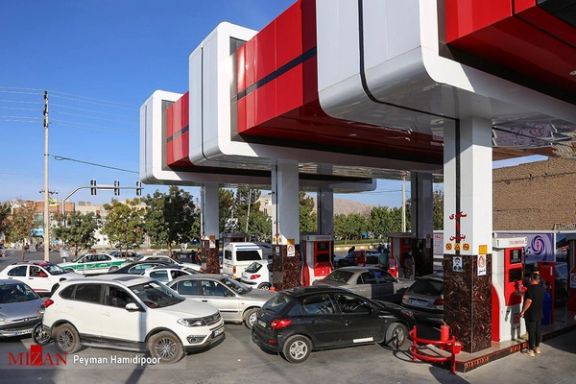
Shortage of gasoline across Iran has prompted widespread concern and panic buying, leading to congestion at numerous gas stations across Iran.

Shortage of gasoline across Iran has prompted widespread concern and panic buying, leading to congestion at numerous gas stations across Iran.
Over the past two days, long queues formed at gas stations in the southern city of Shiraz over fears of price hikes and deficit in supply.
The government continues to deny the shortage, saying that people are reacting to "rumors” with the Minister of Oil insisting there is an adequate gasoline supply nationwide.
However, local officials and members of parliament are concerned. Ruhollah Nejabat, Shiraz’s representative in parliament, stated, "In Shiraz, gasoline has not been adequately supplied to the people for two days, despite the Minister's claims to the contrary."
Long queues of vehicles formed at gas stations across the country on Wednesday, despite assurances from regime officials that prices would not increase, and the country's fuel tanks “remained full”.
A video released by the IRGC-affiliated Tasnim News Agency highlighted the severity of the situation, showing a queue of vehicles at a gas station in Karaj, west of Tehran, stretching over a kilometer.
Iran's Minister of Oil responded saying that fuel station cards are intended for emergency situations and that the lines forming at gas stations are a result of increased travel.
The current situation harks back to November 2019 when a sudden increase in gasoline prices sparked widespread protests, leading to anti-government sentiments and a strong response from security forces.
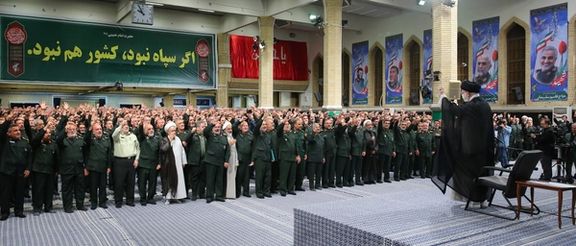
Iran’s ruler Ali Khamenei has praised the Revolutionary Guard while their loyalty and power to quash dissent will be put to test once again during possible protests.
In a meeting with a group of senior IRGC officers and Basij paramilitary leaders on Thursday, Khamenei described the Revolutionary Guard as “the largest counter-terrorist organization in the world,” while international calls to designate the group as a terrorist outfit have been echoing across the political landscape of many countries.
Reacting to Khamenei’s flattering words, hundreds of Iranians rushed to social media to point out that the statement is accurate as long as the prefix “counter or anti” is removed from the word terrorist.
Washington designated the IRGC as a foreign terrorist group in 2019 and US lawmakers have made repeated calls to their allies to prioritize designating the group as such. In May, a bipartisan group of US congresspeople sent letters to the heads of US-allied nations -- the UK, Australia, Canada, and India – to reiterate calls to swiftly act and officially sanction the IRGC in its entirety.
Despite numerous pleas by politicians, diplomats, opposition leaders and activists, the UK and EU are still hesitant to proscribe the entity, which has proved to be the most destabilizing element in the Middle East region and a big threat to American and European citizens in the world, as well as the main suppression force in Iran.
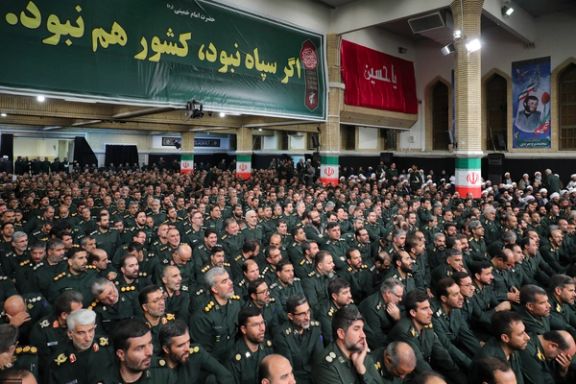
During the meeting with his most important base of support, Khamenei warned of attempts to besmirch the IRGC and Basij forces, saying, "One of the important aspects of the enemy's activities is tarnishing the image of the IRGC. and the Basij; why? Because the Guard is awe-inspiring, the Basij is impressive, which makes them worried and anxious."
Elsewhere in his remarks, Khamenei emphasized that the US is the main enemy of the regime, saying that one of the past mistakes was not recognizing the US as ‘the enemy.’ “We must raise our voice against America,” he said.
The blandishment by the Supreme Leader came as many Iranians are planning to hold anti-regime protests to mark the anniversary of the Women, Life, Liberty movement, Iran’s biggest popular uprising sparked by the death in custody of 22-year-old Mahsa Amini in mid-September.
Khamenei depends on the IRGC and Basij to defend the main bastion of the regime as he cannot trust the traditional Army, which has been kept weak. However, minutes of a meeting of senior clerics and IRGC commanders with Khamenei, leaked to the media in March, indicated the negative impact of the protests on the morale of forces under the command of the IRGC and their burn-out, with several offering anecdotal accounts of insubordination.
“It is a well-equipped military organization. It is an efficient and independent organization capable of carrying out tasks that many of the world's major militaries cannot accomplish,” Khamenei stated during the Thursday meeting with the Supreme Assembly of Commanders of the IRGC.
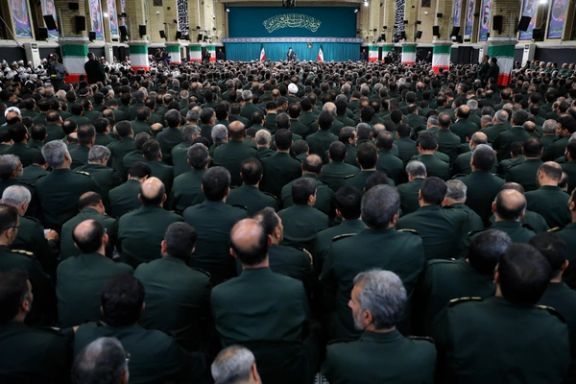
IRGC’s extraterritorial Quds force leads activities of regime’s proxy forces against the United States, Israel, and other adversaries in the region and beyond. The IRGC is providing drones and missiles for the Russian invasion of Ukraine, and is also involved in assassinations, kidnappings and cyberespionage operations across the globe.
The outfit is also behind drugs and arms trafficking and money-laundering and other cases of economic corruption both in Iran and abroad. The IRGC is also the main force to suppress any critical voice in Iran with its members unofficially exempt from due process in case of wrongdoing and corruption.
Over 500 Iranians have been killed by security forces, mainly consisting of the IRGC and its Basij militia, during the crackdown on the last year protests, which may resume throughout Iran in the coming weeks.
Numerous politicians across France, Germany, the UK, and other European nations are eager to push for the designation of the IRGC, asserting that it has been significantly delayed. Resolutions have also been adopted in their respective parliamentary bodies, underscoring the pressing need for the IRGC's designation. However, both UK and European governments perceive this step as a potential impediment to diplomatic engagement with the Tehran regime.
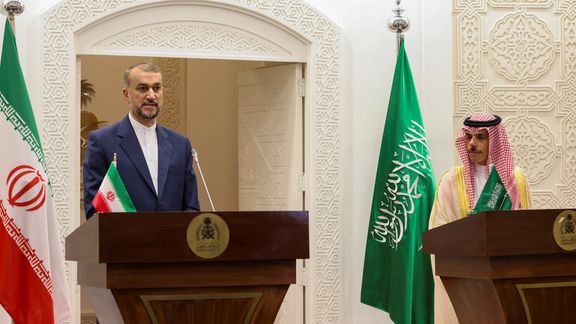
Saudi Arabia and Iran are making progress on mending ties, Iran's foreign minister said after meeting with his counterpart in Riyadh on Thursday.
The two regional heavyweights seek to overcome past hostility and regional tensions, such as rivalry in Yemen or Iran’s attempts to establish military domination in the Persian Gulf..
"Relations between Tehran and Saudi are on the right track and we are witnessing progress," Hossein Amir-Abdollahian said in a joint news conference with his Saudi counterpart Prince Faisal bin Farhan, adding that "the talks were successful".
His visit to the kingdom comes months after Prince Faisal met with Iranian officials in Tehran in June on his first trip to Iran after a China-brokered deal between the regional rivals in March to resume ties.
Under the deal, Tehran and Riyadh agreed to end a diplomatic rift and reestablish relations following years of hostility that had endangered regional stability in the Persian Gulf, as well as in Yemen, Syria and Lebanon.
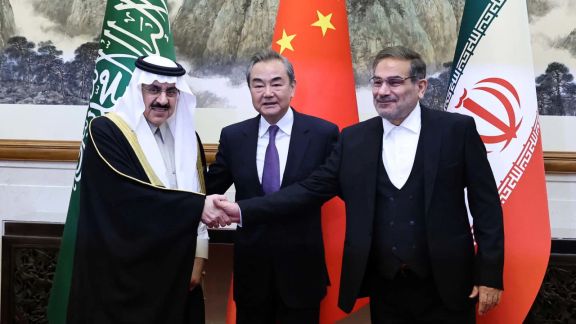
Saudi Arabia broke ties with Iran in 2016 after protesters attacked its embassy in Tehran in retaliation for Riyadh's execution of a prominent Shiite cleric.
"We had good discussions over a broad range of issues during our meetings today," Amir-Abdollahian said.
Prince Faisal said the kingdom hoped to see Iran's President Ebrahim Raisi visit the kingdom following King Salman bin Abdulaziz's invitation, which he had communicated during the June visit. Raisi has said he would travel to the kingdom at the "appropriate time".
Prince Faisal said the kingdom was keen to follow through with all main points of the China-brokered deal whether economic or political, adding the countries' ambassadors will start in their positions in their respective embassies after their reopening.
In June, Iran officially reopened its embassy in Saudi Arabia and Iranian state media reported earlier this month that the kingdom's embassy in Tehran had resumed operations.
"We look forward to a new phase in our relationship based on our Islamic brotherhood and work towards common interests," Prince Faisal said, adding that he welcomed Iran's endorsement of Riyadh's bid to host Expo 2030.
The United States has been engaged in an effort to normalize ties between Saudi Arabia and Israel and expand the Abraham Accords launched under the Trump administration in 2020, when the United Arab Emirates and Bahrain, close Saudi allies, established ties with Israel.
Iran, suffering from a serious economic crisis and isolation, has opted to release US hostages it has detained for years in exchange for Washington agreeing to free its frozen assets from Iraq and South Korea. Many observers believe that unblocking the assets goes further than a prisoner exchange deal and might be aimed at an informal arrangement whereby Iran refrains from escalating its nuclear program.
Reporting by Reuters
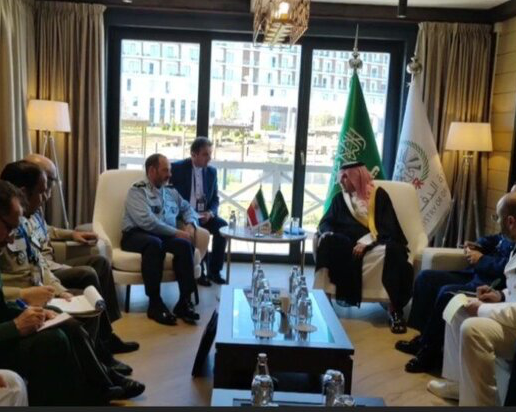
High-ranking military officials from Iran and Saudi Arabia held an official meeting on Wednesday in Moscow.
This is the first time the two nations' military representatives have met since Riyadh and Tehran agreed to resume diplomatic relations.
According to an official announcement from the Ministry of Defense of Saudi Arabia, Talal bin Abdullah Al-Otaibi, the Deputy Minister of Defense, engaged in a productive discussion with Aziz Nasirzadeh, the Deputy Chief of Staff for the Armed Forces of Iran. This dialogue took place during the 11th Moscow International Security Conference, organized under the patronage of the Russian Ministry of Defense.
The IRNA state news agency reported that the primary focus of the meeting was to underscore the commitment of both nations to the China-brokered agreement that restored diplomatic relations between Iran and Saudi Arabia in March.
One of the significant outcomes of this meeting was the mutual decision to facilitate the expedited exchange of military affiliates between the two countries, added IRNA.
This thawing of relations comes against the backdrop of years of severed ties between Tehran and Riyadh, originating from the organized attack on Saudi Arabia's diplomatic installations in Tehran and Mashhad in 2016. Tensions escalated in the proceeding years, with notable incidents including the Houthi-led assault on Saudi oil facilities in September 2019. While Saudi Arabia attributed the attack and related maritime incidents to the Islamic Republic, Tehran consistently refuted these allegations.
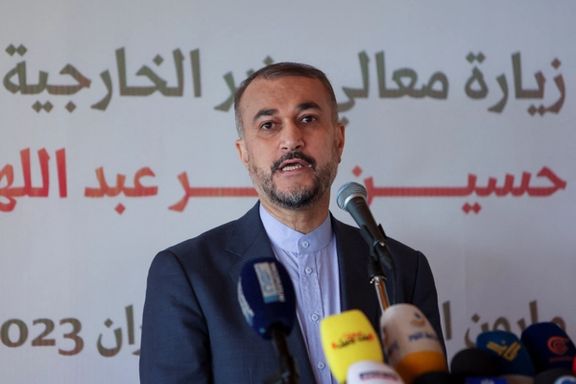
Iran Foreign Minister Hossein Amir-Abdollahian departed from Tehran on a visit to Saudi Arabia on Thursday, Iranian state media reported.
In June, Saudi Arabian Foreign Minister Prince Faisal bin Farhan met with Iranian officials in Tehran on his first visit to the country after the resumption of diplomatic ties with the Islamic Republic in March.
The two countries had no diplomatic relations for seven years from January 2016 when government-backed Iranian mobs attacked and ransacked Saudi missions after Riyadh executed a pro-Iran Shiite cleric. Saudi Arabia cut diplomatic ties after the incidents.
In March, Iran and Saudi Arabia agreed in a China-brokered deal to end the diplomatic rift and reestablish relations following years of hostility that had endangered regional stability in the Persian Gulf, as well as in Yemen, Syria and Lebanon.
The official government news agency IRNA reported that Iran’s first ambassador in more than seven years accompanies the foreign minister. Earlier this week Amir-Abdollahian announced that the Saudi ambassador will soon arrive in Tehran and the two embassies are already staffed.
The United States has been engaged in an effort to normalize ties between Saudi Arabia and Israel to expand the Abraham Accords launched under the Trump administration in 2020, when the United Arab Emirates and Bahrain, close Saudi allies, established ties with Israel.
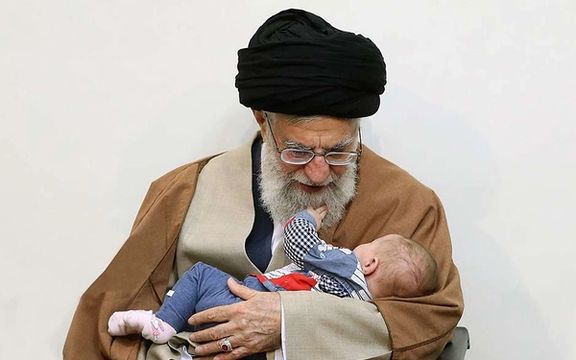
A new ban in Iran on screening kits for congenital anomalies has worried many who fear a sudden surge in the number of children being born with birth defects.
The health ministry’s food and drug administration website announced last week that it will no longer issue permits for production or imports of pregnancy associated plasma protein-A (PAPP-A) and free beta human chorionic gonadotropin (Beta-hCG) test kits.
Media have also reported that the ministry has been refusing to allow production or importation of enzyme linked immunosorbent assay (ELISA) tests.
These tests usually carried out during the first trimester of pregnancies are used to identify and assess the risk of various congenital conditions such as Down Syndrome and fetal aneuploidy (chromosomal anomalies) such as trisomy.
When asked about the discontinuation of the production and imports of these kits on Monday, the ministry spokesman, Pedram Pak-Ayeen, claimed that there was no ban and fetal screening has only been “standardized”.
The spokesman’s denial of the ban does not seem to be convincing to many including genetics experts and women’s rights activists who say denying them to women to preclude possibility of abortion is interfering in people’s personal decisions and violates women’s right to their bodies.
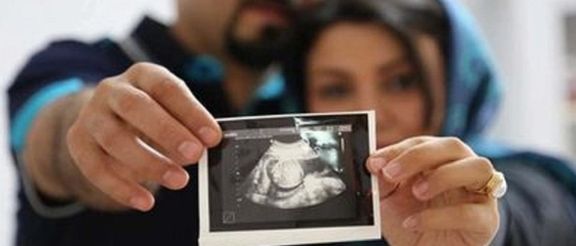
Calling the ministry’s decision “shocking”, Dr Mohammad-Amin Tabatabei, a member of the board of directors of the Iranian Genetics Society, said Monday that Iranians will be facing a greater risk of babies born with congenital and genetic anomalies due to the ban.
Tabatabaei stressed that the ministry has not consulted the genetics society and that the society will officially protest to the decision soon and demand a re-evaluation and warned that the ban could result in illegal imports of “notoriously expensive kits of uncertain standards.”
“Until now we had underground abortions, now we are going to have underground screening too,” a medical professional, Dr Mohammad Mir-Mohammadkhan, said in a post on X (former Twitter) Sunday.
Abortions have always been illegal in Iran, but termination was allowed during the first 18 weeks of pregnancy if the fetus was diagnosed with genetic disorders or carrying the fetus to term threatened the mother’s health or life.
On April 17, Soleiman Haydari, an official of the health ministry, told the Iranian Students News Agency (ISNA) that annually as many as 10,000 abortions were legally carried out.
In the past ten years the Iranian healthcare system has hugely limited screening tests and legal abortions and completely stopped its decades-old family planning programs.
Iran’s primary healthcare program had introduced several screening tests In 1991 that were routinely carried out as part of the existing mandatory premarital blood tests to prevent and control non-communicable diseases which have now been abandoned.
The government has also banned the sale of contraceptives and taken tough action against doctors and midwives who assisted terminations outside the healthcare system and shut down their clinics.
In July 2022 the health ministry announced that it had established a portal for medical professionals to register all pregnancies as a preventative measure against illegal abortions.
Iran's Supreme Leader Ali Khamenei believes efforts to increase the country's population are among the most urgent duties and essential policies of the Islamic Republic as the leading Shia country in the Muslim world and has repeatedly demanded that the population increase to 150 million.
The childbirth rate in Iran has been steadily declining over the past few decades. In the early 1980s, the population growth rate reached 4.8 percent. This rate has dropped to below one percent in the past decade.
Iran's population has doubled from around 40 million in the early 1980s to 84 million, but a declining birth rate means the median age at 32 is about the same as Saudi Arabia at 31.8, but higher than Iraq at 21.